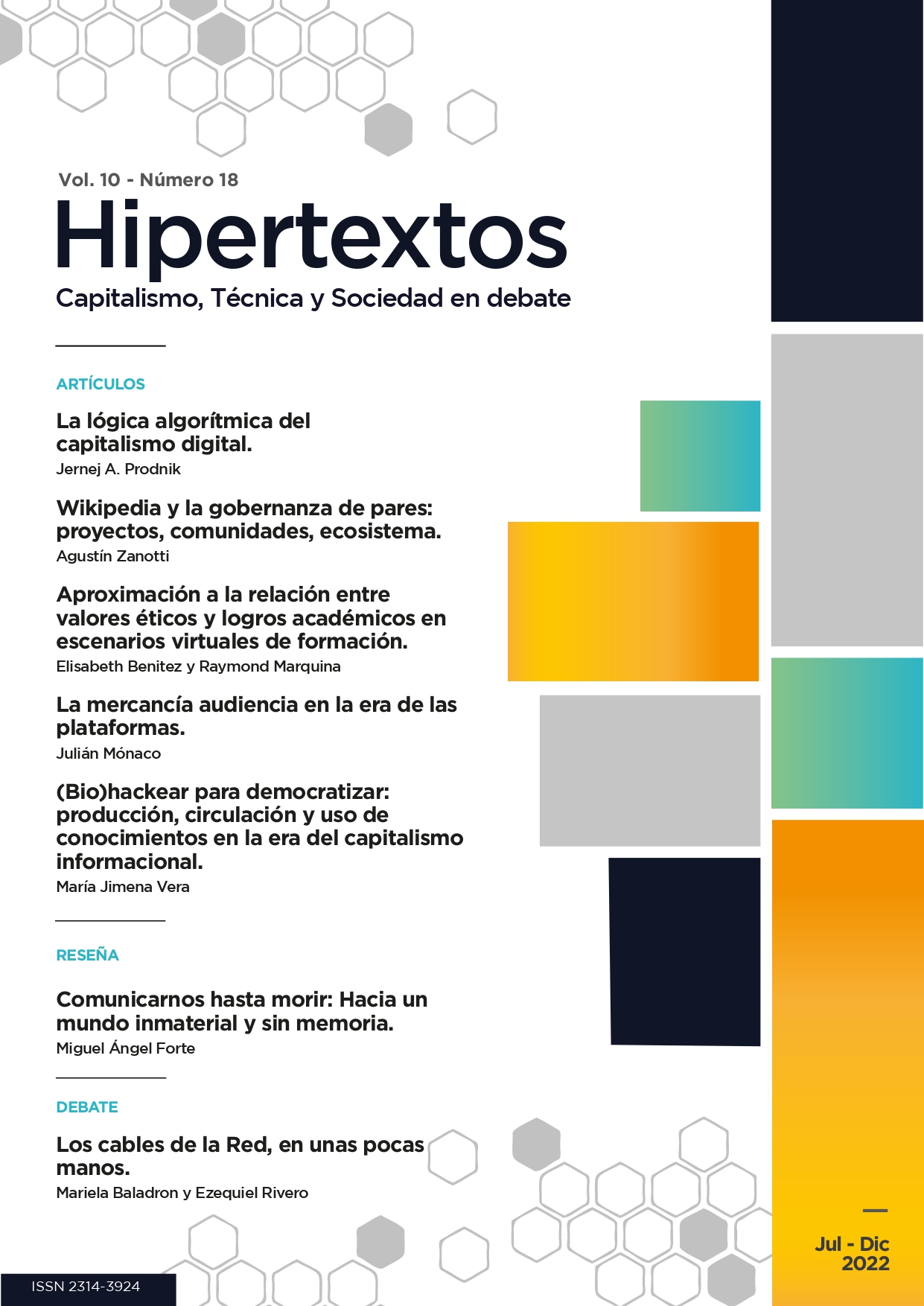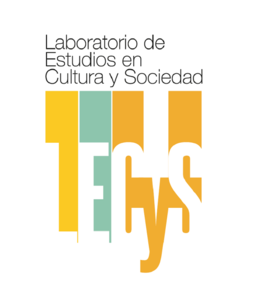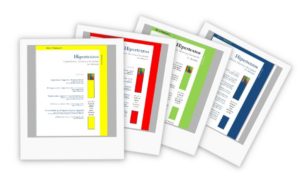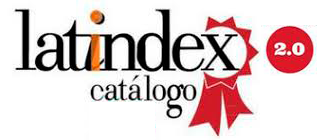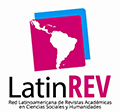Wikipedia and peer governance: projects, communities, ecosystem
Proyectos, comunidades, ecosistema
DOI:
https://doi.org/10.24215/23143924e056Keywords:
peer production, informational commons, mass collaboration, peer governance, online communityAbstract
Wikipedia is a free, multilingual and collaborative encyclopedia. In 2021, it celebrated its 20th anniversary, being singled out as a success story in common based peer production. It is based on a constantly evolving wiki platform, which allows user-editors to coordinate the work of creating and improving entries. The project is supported by a foundation together with a network of local organizations, being one of the only major Internet sites governed by a non-profit.
The article is based on the concept of peer governance. Initially conceived for FLOSS projects, the term allows us to understand participation and decision-making processes in the open production of informational goods. Three levels of governance are identified referring to: 1. the project (its evolution, organization and infrastructure); 2. the community (its deployment, institutions and activities); 3. the ecosystem (relationships with external actors and insertion).
Based on a documentary approach, a journey through key moments in the development of Wikipedia and its sister initiatives is proposed. This aims to generate a panoramic understanding of the project, within a dynamic and concentrated framework of connective media.
The results analyze the development of Wikimedia as a sociotechnical trajectory. Its first years mark an exponential deployment, at the origins of Web 2.0. Community development was a priority in the last decade, with emphasis on greater equity between regions, groups and genders, promoting decentralization processes. Links with educational, academic and cultural institutions, international organizations and technology companies were also consolidated. This gave rise to relations of cooperation and opposition, while the project established positions in the global governance of the Internet.
Downloads
References
Aimar, L., Pagola, L. y Zanotti, A. (2021). Editatones para el abordaje de sesgos en Wikipedia en español. Análisis de tres experiencias de edición colectiva y simultánea sobre la enciclopedia libre. Virtualidad, Educación y Ciencia, 12(22), 66-83.
Bauwens, M. (2005). The political economy of peer production. CTheory, 12-1.
Benkler, Y. y Nissenbaum, H. (2006). Commons-based peer production and virtue. Journal of political philosophy, 14(4).
Benkler, Y., Shaw, A. y Mako Hill, B. (2015). Peer Production: A Form of Collective Intelligence. En T. Malone y M. Bernstein (Eds.), Handbook of Collective Intelligence. Cambridge: MIT Press.
Banco Interamericano de Desarrollo (BID). (2020). Fundación Wikimedia se une a coalición para promover habilidades del siglo 21. https://www.iadb.org/es/noticias/fundacion-wikimedia-se-une-coalicion-para-promover-habilidades-del-siglo-21
Bijker, W. E. (1993). Do not despair: there is life after constructivism. Science, Technology, y Human Values, 18(1), 113-138. https://doi.org/10.1177/016224399301800107
Bijker, W. E. (1995). Of Bicycles, Bakelites and Bulbs. Towards a Theory of Sociotechnical Change. Cambridge: MIT Press.
Bohnsack, R. (2014). Documentary method. In Flick, U. (ed.) The SAGE handbook of qualitative data analysis, pp. 217-233, London: SAGE.
Bruns, A. (2008). Blogs, Wikipedia, Second Life, and beyond: From production to produsage. New York: Peter Lang.
Claes, F. y Tramullas, J. (2021). Estudios sobre la credibilidad de Wikipedia: una revisión. Área Abierta, 21(2), 187-204. https://doi.org/10.5209/arab.74050
Cruz, M. (2017, julio 25). Wikimedia y el ecosistema de conocimiento libre. ObservatorioDeRedes. https://oderedes.medium.com/wikimedia-y-el-ecosistema-de-conocimiento-libre-61b8915dcfe5
Diff. (2021, 3 de noviembre). Launch of the Wikimedia Research Fund. https://diff.wikimedia.org/2021/11/03/launch-of-the-wikimedia-research-fund/
El País. (2019, mayo 15). China bloquea por completo el acceso a Wikipedia. https://elpais.com/internacional/2019/05/15/actualidad/1557917501_372709.html
Ford, H. (2015). Fact Factories: Wikipedia and the power to represent. [Disertación Doctoral, University of Oxford].
Ford, H. (2020). Rise of the Underdog. En J. R. Reagle y J. L. Koerner, Wikipedia@20. Stories of an Incomplete Revolution. Cambridge: The MIT Press.
Goel, S., Anderson, A. y Zia, L. (2018, 9 de enero). "We keep the servers going … and much more": Recent highlights from our Technology department. https://wikimediafoundation.org/news/2018/01/09/technology-department-highlights/
Hill, B. M. y Shaw, A. (2020). Wikipedia and the End of Open Collaboration?. En J. R. Reagle y J. L. Koerner, Wikipedia@20. Stories of an Incomplete Revolution. Cambridge: The MIT Press.
Jemielniak, D. (2014). Common Knowledge? An Ethnography of Wikipedia. Palo Alto: Stanford University Press.
Keegan, B. (2020). An Encyclopedia with Breaking News. En Wikipedia @ 20. En J. R. Reagle y J. L. Koerner, Wikipedia@20. Stories of an Incomplete Revolution. Cambridge: The MIT Press.
Konieczny, P. (2010). Adhocratic governance in the Internet age: A case of Wikipedia. Journal of information technology & politics, 7(4), 263-283.
Larman, C. y Basili, V. R. (2003). Iterative and incremental developments. A brief history. Computer, 36(6), 47-56.
Lorente, P. (2020). El conocimiento hereje. Una historia de Wikipedia. Buenos Aires: Paidós.
Maher, K. (2018, 18 de octubre). Wikipedia is a mirror of the world’s gender biases. WMF. https://wikimediafoundation.org/2018/10/18/wikipedia-mirror-world-gender-biases/
Morell, M. F. (2014). 8 Governance of Online Creation Communities for the Building of Digital Commons: Viewed through the Framework of Institutional Analysis and Development. En B. M. Frischmann, M. J. Madison y K. J. Strandburg, Governing knowledge commons, 281. New York: Oxford University Press.
Nielsen, J. (2006). The 90-9-1 Rule for Participation Inequality in Social Media and Online Communities. https://www.nngroup.com/articles/participation-inequality/
Nyman, L. y Lindman, J. (2013). Code Forking, Governance, and Sustainability in Open Source Software. Technology Innovation Management Review, 3(1), 7-12.
Reagle, J. M. (2010). Good faith collaboration: The culture of Wikipedia. Cambridge: MIT Press.
Redi, M., Gerlach, M., Johnson, I., Morgan, J. y Zia, L. (2020). A taxonomy of knowledge gaps for wikimedia projects (second draft). arXiv preprint arXiv:2008.12314.
Thomas, H. (2008). Estructuras cerradas vs. Procesos dinámicos: trayectorias y estilos de innovación y cambio tecnológico. En H. Thomas y A. Buch, Actos, actores y artefactos. Sociología de la tecnología. Bernal: UNQ.
Van Dijck, J. (2016). La cultura de la conectividad: una historia crítica de las redes sociales. Buenos Aires: Siglo XXI.
Van Dijck, J., Poell, T. y De Waal, M. (2018). The platform society: Public values in a connective world. Oxford University Press.
Vélez, J. G. y Zanotti, A. (2020). La producción en comunidades FLOSS: empresas, fundaciones y governance. En H. Morero y J. Motta (Eds.), La economía del software libre y open source: Multinacionales, Pymes y Comunidades. Buenos Aires: Estudios Sociológicos.
Vrandečić, D. (2020). Collaborating on the sum of all knowledge across languages. En J. R. Reagle y J. L. Koerner, Wikipedia@20. Stories of an Incomplete Revolution. Cambridge: The MIT Press.
Wales, J. y Tretikov, L. (2015, 10 de marzo). Stop Spying on Wikipedia Users. The New York Times. https://www.nytimes.com/2015/03/10/opinion/stop-spying-on-wikipedia-users.html?_r=0
World Health Organization (WHO). (2020). The World Health Organization and Wikimedia Foundation expand access to trusted information about COVID-19 on Wikipedia. https://www.who.int/news/item/22-10-2020-the-world-health-organization-and-wikimedia-foundation-expand-access-to-trusted-information-about-covid-19-on-wikipedia
WMF. (2011). Wikimedia Strategic Plan. A collaborative vision for the movement through 2015. https://upload.wikimedia.org/wikipedia/commons/c/c0/WMF_StrategicPlan2011_spreads.pdf
WMF. (2017). Strategy 2030 Wikimedia’s role in shaping the future of the information commons. https://upload.wikimedia.org/wikipedia/commons/6/67/Strategy_2030_Wikipedia%27s_role_in_shaping_the_future_of_the_information_commons.pdf
WMF. (2021). Estadísticas de Wikimedia. https://stats.wikimedia.org/#/all-projects
WMF. (2021). Celebrando 20 años de Wikipedia. https://wikimediafoundation.org/es/wikipedia20/
WMF. (2021, julio 13). Technology Department Highlights from the Wikimedia Foundation 2021-2022 Annual Plan. https://www.youtube.com/watch?v=OaBA45kR78Q
WMF. (2021, 14 de agosto). From Encyclopedia to Big Data: Past, present and future of Wikipedia data as a research source. https://www.youtube.com/watch?v=i9CGCBYTgEk
WMF. (2021, octubre 5). China again blocks Wikimedia Foundation’s accreditation to World Intellectual Property Organization. https://wikimediafoundation.org/news/2021/10/05/china-again-blocks-wikimedia-foundations-accreditation-to-world-intellectual-property-organization/
Wright, E. O. (2014). Construyendo utopías reales. Madrid: Akal.
Zanotti, A. (2021). Wikimedia y la cobertura del COVID-19 en español: producción colaborativa de conocimientos en temas de actualidad. Área Abierta, 21 (2), 271-287.
Zanotti, A. y Vélez, J. G. (2020). Desarrollo floss y gobernanza de pares: el caso del entorno de escritorio GNOME. International Journal of Innovation, 8(3), 438-465.
Downloads
Published
How to Cite
Issue
Section
License

This work is licensed under a Creative Commons Attribution-NonCommercial-NoDerivatives 4.0 International License.

